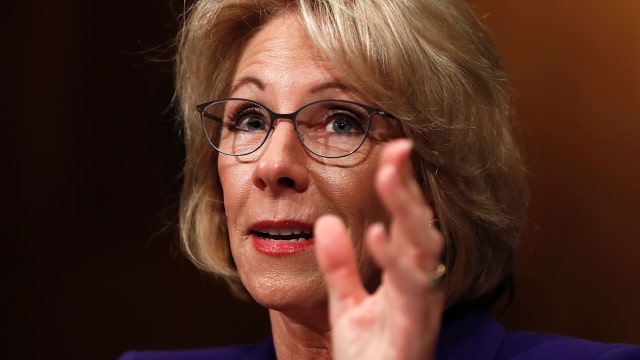DeVos opposition now claiming she'll ruin public schools
Strategy Room: David Mercer and Bradley Blakeman on Capitol Hill outrage over Trump's pick
This week, Democrats made history by forcing Vice President Mike Pence to cast the deciding vote for Education Secretary Betsy DeVos. Why did Democrats decide to engage in all-out war against an education secretary? Why devote weeks of phone calls, media interviews, and emotional energy to defeating her rather than one of the other cabinet nominees?
Some Democrats and mainstream media outlets have focused their opposition on claims that Mrs. DeVos having “radical” views. Yet, as New York Times columnist Ross Douthat has noted, Secretary DeVos’ views are not so different from the Obama administration’s pro-charter schools position and are almost identical to the perspectives of centrist Democrats such as Senator Cory Booker.
Other Democrats and media outlets have opposed Mrs. DeVos because she lacks experience as a government bureaucrat or school administrator. They also highlight her inability to answer certain questions during the confirmation hearings.
But are these the real reasons Democratic opposition heightened to a fever pitch? No.
As opinion pieces in the New York Times and Wall Street Journal have argued, the overheated Democratic opposition is motivated by:
? Some of their party’s most deep-pocketed and powerful interest groups—teachers’ unions—who realize that they will no longer have a near-monopoly on education.
? Their party’s upper-middle-class suburbanite constituency, who understand that DeVos’ charters and vouchers will be attractive to families with financial disadvantages, ethnic minority heritage, or ideological and religious convictions that differ from the mainstream. In other words, private schooling will be accessible to children who are very different than the Democratic Party’s upper-middle-class suburbanites.
In response to the Democratic Party’s powerful interest groups and upper-middle-class suburbanite constituency, here are four reasons why DeVos may turn out to be a welcome remedy to our nation’s educational ills.
1. Liberation from Bureaucracy. DeVos’ educational philosophy could enable her to liberate American education from encroachment by federal bureaucracy. Under the Obama administration, the federal government functioned as a giant octopus, bypassing families, communities, and states in order to reach its tentacles into school curriculum, teacher evaluation, values conformity, and even restroom policies. DeVos signals a departure from that era. Her stated educational philosophy suggests that she will not turn Democratic encroachment into Republican encroachment; instead, she will reduce federal encroachment in order to empower families, local communities, and states.
2. Freedom of Thought
Much ado has been made about Secretary DeVos’ Dutch Calvinism. But that’s misguided.
Dutch Calvinism is a rich religious tradition that emphasizes the rights and freedoms of families, communities, and religions. For that reason, it finds adherents on the right and on the left.
Additionally, it places an especially high value on education, but emphasizes that a pluralistic society should be tolerant enough to allow diverse families and communities to build their own educational institutions and choose which institution(s) their children can attend. Unfortunately, many liberal educators are quite illiberal, unwilling to tolerate any type of educational diversity that undermines the federal government’s impulse toward command-and-control.
3. Empowerment for the Financially-Disadvantaged
DeVos’ educational philosophy would allow financially-disadvantaged children to choose the education that fits their unique needs and abilities. In the current system, the government taxes citizens in order to provide education, but then dictates and determines how the tax money can be used. The message is clear: the federal government—rather than the family or local community—is responsible for shaping the way a child understands and interprets the world.
Under DeVos’ potential system of vouchers and charters, however, citizens will be able to exercise more influence over their own child’s education. They will also be able to send their children to a wider variety of schools, including those that would have been financially prohibitive without the vouchers. This sort of system is supported by prominent intellectuals and educators such as Anthony Bradley and has been supported in the past by Democratic politicians such as Cory Booker.
4. Facilitation by a Philanthropist
DeVos’ critics argued that she wasn’t qualified to serve as our new Secretary of Education because she had not served as a teacher, a principal, or an educational policy wonk. Yet, those experiences are not necessary prerequisites for the office. As Michael Petrilli noted, Secretary DeVos has devoted her life energies and financial resources to the cause of education and has interacted extensively with politicians and educational policy makers. Although her path to the post of secretary is different than her predecessors, it is a good path and one that qualifies her.
Hope for our Children’s Education
We already know that DeVos will be an imperfect Secretary of Education -- just as all prior secretaries of education have been. Yet, there are good reasons to believe that she will be successful.
She is a philanthropist who has proven that she cares deeply about education. She holds a philosophy of education that can reduce bureaucracy, increase free thinking, and empower the financially disadvantaged. And, she has the work ethic and the connections to make it happen.
So let’s just step back for a moment, cool our fevered brows, and pull for Betsy DeVos as she tries to reform our nations’ education system.

